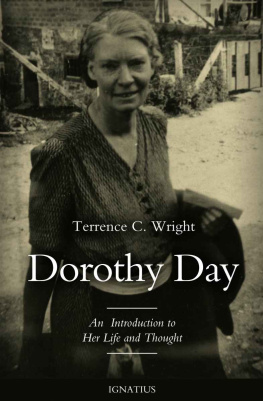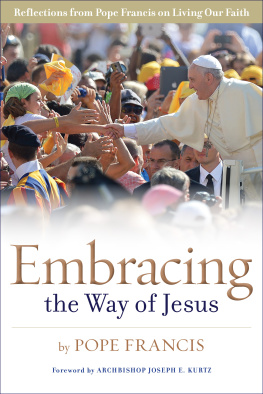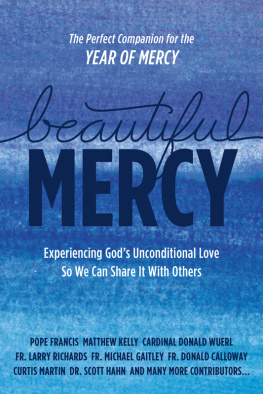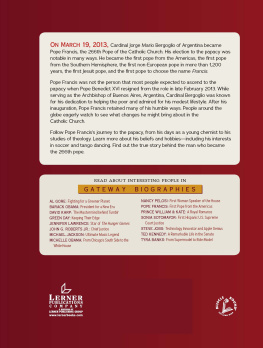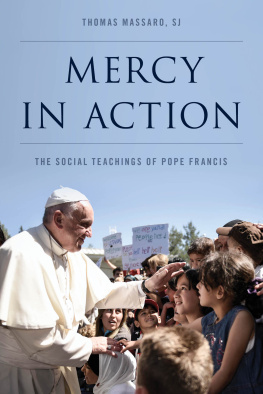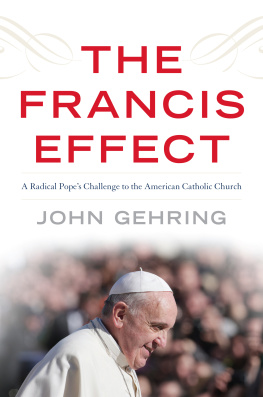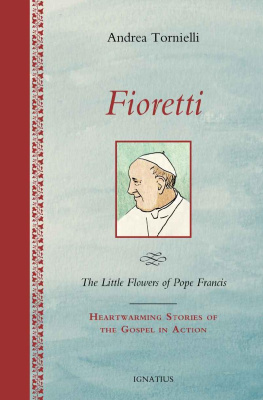DOROTHY DAY
TERRENCE C. WRIGHT
Dorothy Day
An Introduction to Her Life
and Thought
IGNATIUS PRESS SAN FRANCISCO
Unless otherwise indicated, Scripture quotations are from Revised Standard Version of the BibleSecond Catholic Edition (Ignatius Edition) copyright 2006 National Council of the Churches of Christ in the United States of America. Used by permission. All rights reserved worldwide.
Cover photograph:
Dorothy Day at Maryfarm, Easton, PA ca. 1938.
Courtesy of the Department of Special Collections and
University Archives, Marquette University Libraries
Cover design by John Herreid
2018 by Ignatius Press, San Francisco
All rights reserved
ISBN 978-1-62164-157-5 (PB)
ISBN 978-1-64229-033-2 (EB)
Library of Congress Control Number 2017947370
Printed in the United States of America
To my children,
Benedict Canty Wright
and
Rachel Day Wright
We cannot love God unless we love each other, and to love we must know each other. We know Him in the breaking of bread, and we know each other in the breaking of bread, and we are not alone any more. Heaven is a banquet and life is a banquet, too, even with a crust, where there is companionship.We have all known the long loneliness and we have learned that the only solution is love and that love comes with community.Dorothy Day, The Long Loneliness
CONTENTS
ACKNOWLEDGMENTS
Many people have contributed to the completion of this project. I would like to thank the organization ENDOW (Education on the Nature and Dignity of Women) for its early support of this book. In particular I am grateful to Terry Polakovic and Madelyn Winstead for their support, criticism, and comments on an earlier version of the manuscript.
I also want to thank Saint John Vianney Theological Seminary for its support, particularly a sabbatical release, which allowed me to complete this project. More important, I want to thank my colleagues for their encouragement and the staff of the Cardinal Stafford Library for their assistance in my research. But most of all I want to acknowledge my seminary students, whose interest in Dorothy Day reinforced my commitment to writing an introductory book that would serve as a doorway to a deeper exploration of her life and work.
I am also grateful to Vivian Dudro at Ignatius Press, whose careful criticism and comments on the manuscript brought it to its completion.
Finally, I want to thank Susan C. Selner-Wright, who as a friend and colleague critiqued and proofed earlier drafts of the manuscript and supported me through the process. Even more important, as my wife, Susan continues to teach me every day about the importance of doing little things with great love.
PREFACE
If I have accomplished anything in my life, it is because I wasnt embarrassed to talk about God .Dorothy Day
In a historic speech to the United States Congress on September 24, 2015, Pope Francis identified four Americans who shaped fundamental values which will endure forever in the spirit of the American people. Two are well known: Abraham Lincoln and Martin Luther King Jr. The other two are not nearly so well known: Thomas Merton, a Cistercian monk, and Dorothy Day, a Catholic laywoman. Pope Francis described how Days social activism, her passion for justice and for the cause of the oppressed, were inspired by the Gospel, her faith, and the example of the saints as he held her up as a model for the world to follow to give hope to the oppressed. For those unfamiliar with Dorothy Day, this book seeks to provide an introduction to the life and thought of the woman who many consider to be one of the most influential American Catholics of the twentieth century.
Dorothy Day (18971980), together with Peter Maurin (18771949), founded the Catholic Worker movement in 1933. Day was a writer, a public speaker, a convert, and a mother. Her life and writings speak clearly to our contemporary experience. She has inspired countless numbers of people to reflect on the Catholic Church and its role in promoting a more just and peaceful society.
My own experience of Dorothy Day began when I started reading the newspaper the Catholic Worker in college. When I became a teacher I began using Days writings in my classes, and I still do. Part of my reason for writing this introduction came from an experience I had with two of my seminary students, who had studied Day with me. Both men had spent their summer assignments at local parishes. One student told me that a retired priest at his parish had told him how glad he was to hear that they were studying a person who criticized Church teachings, a dissenting Catholiclike Dorothy Dayin the seminary. The other student commented that he had had the opposite experience, that his pastor was angry when he heard they had studied Day, a dissenting Catholic, at the seminary. My response was that I could not imagine why either of them would have thought that Dorothy Day dissented from the teachings of the Catholic Church. Day never understood herself as a dissenter, and in my reading of her I had always been inspired by her fidelity to the Church. In this introduction I hope to show this faithfulness and dispel the mistaken view that she was, with one important exception, a dissenting Catholic. In her pacifism, Day clearly dissented from the teaching on what is known as just war theory, but she grounds this dissent firmly in Scripture.
Many Catholics are selective in their embrace of the teachings of the Church: some claim that the Church is right about teachings regarding sexuality and abortion but wrong or naive about privileging the poor or the need for a just wage; others claim that the Church is right about privileging the poor and the need for a just wage but wrong or out-of-date on sexuality and abortion. Dorothy Day, on the other hand, is a Catholic who thinks that the teachings of the Church are right about all of it. She supported the Catholic teaching on sexual morality as strongly as she supported the teaching on social justice, because she saw that all Catholic teachings arise from the loving message of Jesus Christ in the Gospel. She believed that the Church promoted and perpetuated this message through its teachings and the sacramental life. Day was not ignorant of or naive about the ways in which Catholics and the institutional Church can fall far short of these teachings, but for Day these failures did not diminish the truth of the message. Father Daniel Berrigan, S.J., wrote that Dorothy Day was an inspiration by living as though the truth were true. In an age when it is often easier, more convenient, or more popular to live as if the truth were not true, Dorothy Day continues to stand as a model and an inspiration.
In 1997 the late John Cardinal OConnor of New York officially began the cause for Dorothy Days canonization. In March 2000 her cause was officially accepted by the Vatican, and she was declared a servant of God, the first stage in the lengthy process of canonization. In November 2013 Timothy Cardinal Dolan of New York, in fulfillment of the canonical requirement that a bishop promoting a cause for sainthood consult with local bishops, asked the U.S. Catholic bishops to endorse the cause for Days sainthood. Many of the bishops used this as an opportunity to speak in favor of her cause, and the assembled bishops voted to endorse it.
Because of her life, her writings, and her political stands, Day remains a controversial figure, but she also serves as a challenge to Catholics and non-Catholics alike to reflect on Christs call for us to serve the least of our brothers.
The aim of this work is to introduce readers to the life and teachings of Dorothy Day. The first two chapters present a brief introduction to her early life prior to the founding of the Catholic Worker movement. To appreciate fully the development of her social conscience and her conversion to Catholicism, this brief biography is necessary. The following chapters address her life as the eventual leader of the Catholic Worker movement and explore the rich social doctrine of the Church: a doctrine that shaped Days thinking and that Day, in turn, helped to shape. This work hopes to encourage a deeper understanding of the Churchs social teachings and to place Days work within this context.
Next page
